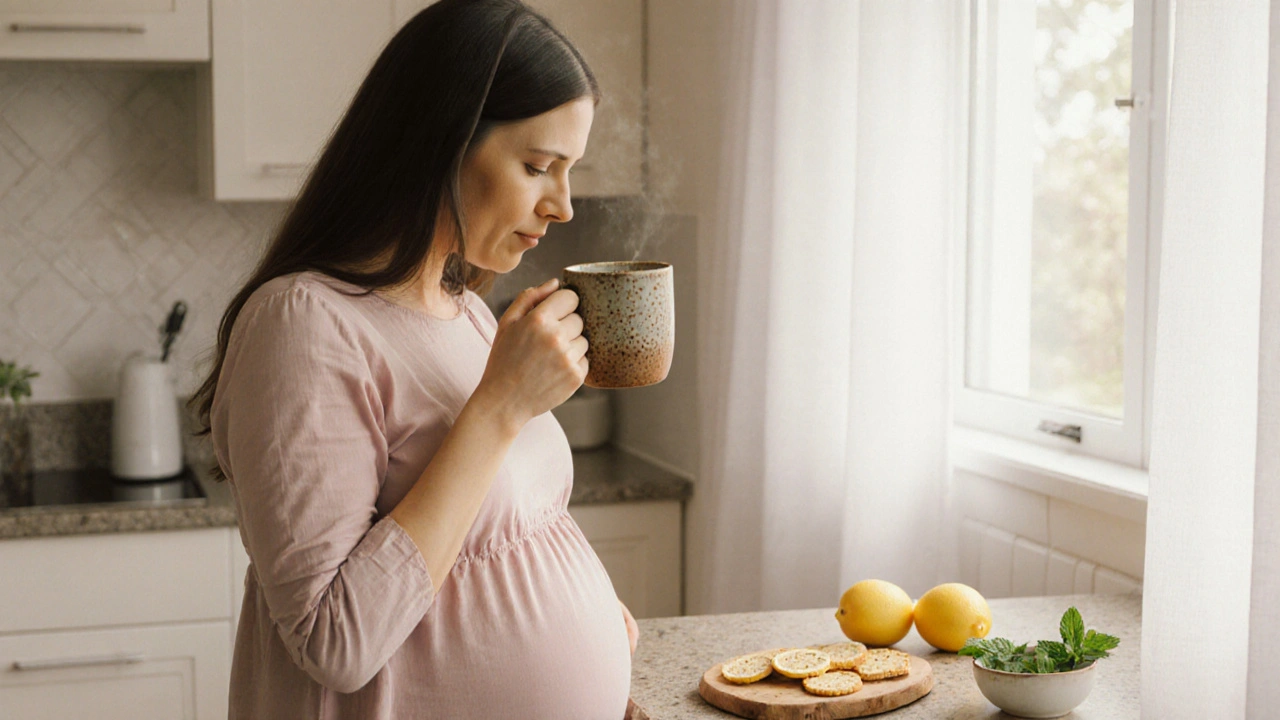Vomiting during pregnancy is a common symptom affecting up to 70% of expectant mothers, especially in the first trimester. While occasional nausea is normal, persistent vomiting can disrupt nutrition, hydration and overall well‑being. This guide breaks down the most effective, evidence‑based ways to prevent vomiting during pregnancy without compromising safety for you or your baby.
What’s really happening? Understanding morning sickness
Morning sickness isn’t limited to mornings; hormones like human chorionic gonadotropin (hCG) and estrogen surge early in gestation, triggering the brain’s nausea center. Roughly 1 in 5 women develop hyperemesis gravidarum, a severe form that can cause weight loss >5% and electrolyte imbalance. Knowing the physiological backdrop helps you target the right interventions.
Everyday habits that make a difference
Simple lifestyle tweaks often provide the biggest relief. Here are the top habits, each linked to an entity you’ll encounter in the rest of the article:
- Eat small, frequent meals - aim for 5‑6 mini‑meals a day instead of three large ones. This keeps blood sugar stable and reduces stomach emptiness, a known trigger.
- Stay hydrated, but sip slowly. Electrolyte solutions (e.g., oral rehydration salts) are better than plain water when you’re vomiting frequently because they replenish sodium and potassium.
- Include ginger in your diet. Fresh ginger tea, candied ginger, or ginger capsules provide a ginger dose of 250-500mg three times daily, shown in a 2022 clinical trial to cut nausea episodes by 40%.
- Try vitamin B6 (pyridoxine). A typical regimen of 25mg three times per day has a safety profile comparable to a prenatal vitamin and can lower vomiting frequency by roughly one episode per day.
- Use acupressure wrist bands. These bands apply pressure to the P6 (Neiguan) point on the inner forearm. A 2021 meta‑analysis reported 60% of users felt “significant improvement” after 30 minutes of wear.
Safe over‑the‑counter options
If natural tricks aren’t enough, the next step is a medication that’s been vetted for pregnancy. The most widely recommended combo is doxylamine‑pyridoxine (often sold as a single‑dose tablet). Doxylamine is an antihistamine that calms the vestibular system, while pyridoxine addresses the B‑vitamin deficiency that can amplify nausea. Clinical guidelines from the Royal College of Obstetricians and Gynaecologists rate it as Category A (no proven risk). Typical dosing: 1‑2 tablets at bedtime, up to 4 tablets per day.
When to call your obstetrician
Most nausea resolves by week16, but you should seek professional care if you notice any of the following:
- Vomiting more than three times per day for several days.
- Weight loss exceeding 5% of pre‑pregnancy weight.
- Signs of dehydration - dark urine, dizziness, rapid heartbeat.
- Inability to keep any oral intake down.
These red flags point toward hyperemesis gravidarum, which may require IV fluids, anti‑emetic prescription, or even hospital admission. Early referral improves outcomes for both mother and baby.

Quick comparison of top natural remedies
| Remedy | Effectiveness* | Safety in pregnancy | Typical use |
|---|---|---|---|
| Ginger | 40% reduction in nausea episodes (2022 RCT) | Generally safe up to 1g/day | 250‑500mg 3×/day (tea, capsules, candy) |
| VitaminB6 (pyridoxine) | 30% reduction in vomiting frequency (2020 meta‑analysis) | CategoryA, no teratogenic risk | 25mg 3×/day (prenatal vitamin or supplement) |
| Acupressure wrist bands | 60% of users report significant relief (2021 study) | Non‑invasive, no drug interactions | Wear 30min before meals, repeat as needed |
*Effectiveness percentages reflect pooled data from randomized controlled trials and systematic reviews up to 2023.
Related concepts you might explore next
Understanding how to prevent vomiting during pregnancy opens doors to other supportive topics. Consider reading about:
- Prenatal nutrition - how balanced macros keep blood sugar steady.
- Stress management techniques - meditation, breathing exercises, and their role in reducing nausea.
- Safe exercise during pregnancy - low‑impact movement that boosts digestion.
Each of these areas compliments the anti‑nausea toolkit and reinforces overall maternal health.
Actionable checklist for day‑to‑day relief
- Start the day with a ginger‑infused smoothie (½inch fresh ginger, banana, yoghurt).
- Take 25mg vitaminB6 with breakfast.
- Wear acupressure wrist bands 15minutes before each meal.
- Drink a cup of electrolyte solution after any episode of vomiting.
- Keep a small snack (crackers, plain toast) by the bedside for early‑morning cravings.
- If symptoms persist beyond week16, schedule a review with your obstetrician.
Frequently Asked Questions
Can I use ginger supplements if I’m allergic to spices?
If you have a known ginger allergy, avoid all forms of the root. The same anti‑nausea benefits can be achieved with vitaminB6 or acupressure wrist bands, which carry no allergen risk.
Is it safe to take doxylamine‑pyridoxine every night?
Yes. The combination is classified as CategoryA by UK guidelines and is considered safe for continuous nightly use throughout pregnancy, unless your doctor advises otherwise.
How much ginger is too much during pregnancy?
Most experts recommend not exceeding 1gram of ginger per day. Going beyond that may increase the risk of heartburn or interfere with blood clotting, though serious complications are rare.
What signs indicate I need medical attention for vomiting?
Seek help if you lose more than 5% of your pre‑pregnancy weight, cannot keep fluids down, notice dark urine, or experience persistent vomiting for more than 48hours. These may signal hyperemesis gravidarum.
Can stress worsen morning sickness?
Stress can amplify the brain’s nausea center, making symptoms feel worse. Incorporating relaxation techniques-deep breathing, short walks, or gentle yoga-often lessens episode frequency.
Are there any foods I should avoid completely?
Strong-smelling, greasy, or highly acidic foods (e.g., citrus, tomatoes, fried items) can trigger nausea in many pregnant women. Switching to bland, low‑fat options like plain rice, bananas, or toast often helps.


11 Comments
Neha Bharti
Eat small, frequent meals throughout the day to keep blood sugar steady and curb nausea.
Samantha Patrick
I’d definately suggest trying ginger tea before bed; it’s simple, cheap, and often works better than meds. Also, keep a stash of electrolyte packets handy – the salty taste can calm the stomach after a bout.
Ryan Wilson
When vomiting becomes frequent you owe it to yourself and the baby to seek proper care, because ignoring symptoms isn’t an option and personal responsibility matters.
EDDY RODRIGUEZ
I hear you, and it’s tough, but remember you’re not alone. Small steps like sipping ginger‑infused water or wearing those wrist bands can make a real difference. Keep experimenting, stay patient, and trust that your body will adjust.
Christopher Pichler
Ah yes, the ever‑reliable P6 acupressure – just slap a wristband on and hope for the best, because nothing screams ‘evidence‑based’ like a plastic band, right?
VARUN ELATTUVALAPPIL
Honestly,‑‑‑the‑wrist‑bands‑‑‑they’re‑‑‑a‑‑quick‑fix,‑‑‑but‑‑‑if‑‑‑you‑‑‑don’t‑‑‑pair‑‑‑them‑‑‑with‑‑‑proper‑‑‑hydration‑‑‑and‑‑‑diet‑‑‑changes‑‑‑the‑‑‑results‑‑‑might‑‑‑be‑‑‑meh!!!
April Conley
Avoid greasy foods; they are a proven trigger.
Sophie Rabey
Because nothing says "relaxation" like a ginger smoothie at 3 am, right? At least it beats another bout of vomit.
Bruce Heintz
👍 Stay hydrated with electrolyte drinks and keep a ginger candy handy – small steps add up, and you’ll feel better soon! 😊
richard king
Morning sickness can feel like a cosmic joke, a reminder that our bodies are negotiating with a new life inside.
Ancient cultures saw nausea as a rite of passage, a symbolic shedding of the old self.
Modern science, however, pins the culprit on hormonal surges that flood the brain's chemoreceptor trigger zone.
What matters is how we translate that knowledge into practical relief.
Ginger, with its zing of gingerol, interacts with serotonin receptors to mute the nausea signal.
Vitamin B6 acts as a co‑factor in neurotransmitter synthesis, smoothing out the erratic spikes.
Acupressure wrist bands, though simple, exploit the P6 meridian, a concept rooted in traditional Chinese medicine yet validated by meta‑analyses.
Hydration, especially electrolyte‑rich fluids, restores the ionic balance that vomiting otherwise disrupts.
If these measures fail, the safe combination of doxylamine‑pyridoxine offers pharmacologic calm without endangering the fetus.
But even the best regimen won’t replace attentive monitoring for signs of hyperemesis gravidarum.
Weight loss beyond five percent, persistent dehydration, or an inability to keep any nourishment down signals a medical emergency.
In those moments, intravenous fluids and professional anti‑emetics become not a luxury but a necessity.
Pregnant individuals should also lean on supportive networks, because stress amplifies the nausea loop.
A calm environment, gentle breathing, and a dash of humor can break that cycle more effectively than any pill.
Ultimately, navigating morning sickness is a blend of evidence‑based tactics and personal resilience, a dance between science and the body’s innate wisdom.
Matthew Shapiro
Keeping a daily log of meals, fluids, and any episodes can help you pinpoint triggers and discuss them with your provider more effectively.